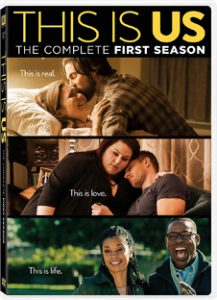Having already been renewed through its third season, “This Is Us” is a show we’ll be talking about for a while. After last Tuesday’s Season 1 finale, I Facebooked that it successfully made me cry in 18 out of 18 episodes, and that it’s the #bestshowontv. That hashtag was mostly used by other “This Is Us” fans that night, which is to be expected. But it’s worth noting that “This Is Us” (which tallies an 8.9 on IMDB) still garners the most #bestshowontv labels a week later – and this ain’t exactly the vast wasteland era of TV.
Others will argue that ranking it among the elite shows is laughable. Indeed, there’s no need to wait for a sophomore-season backlash; critical marginalization of “This Is Us” happened concurrently with its popular breakthrough. In the fall, Entertainment Weekly gave it more coverage than any other freshman series, picking it among the five new shows to watch, giving it a cover story, and interviewing creator Dan Fogelman every week about the latest revelations. But it didn’t make EW’s year-end top 10, or even the top 20! “This Is Us” was also snubbed by The Onion AV Club, in which it missed the top 30! Do a Google search for “This Is Us manipulative” and you’ll have hours’ worth of reading.
I have a foot in both camps, as a TV fan who used to be paid to share my TV opinions back when newspapers covered entertainment. I watch more TV than the average Joe, but much less than if I were a paid TV reviewer. But in this debate, I feel like a lazy ol’ TV fan. I think “This Is Us” is being rightfully embraced by the masses and wrongfully overlooked by critics. I think it’s a special show.
Setting aside the pretentious-at-first-blush title, let’s look at that title’s stark promise: Unlike anything before it, this is supposed to be a show about real people. Or at least real Americans. Does it succeed? Well … 71 percent of Americans are overweight, and prior to “This Is Us,” the only overweight TV Americans were sitcom or cartoon dads.
So Kate (Chrissy Metz) is a breakthrough character, not only in that she’s fat, but also in that her weight affects everything about her life – perhaps because she sees zero people like her on TV (although, in an example of restraint, “This Is Us” doesn’t go full circle and address that point). She even temporarily throws away a relationship with a perfect guy, Toby (Chris Sullivan). In being fat, he looks like 71 percent of Americans, but in terms of always saying the right thing to make his girlfriend feel better, he represents about 3 percent of people.
Kevin (Justin Hartley) also has nothing to do with “us.” He’s a flawless physical specimen. He’s a successful sitcom actor. He can land any woman he wants. He transitions to theater and nails it. His big conflict is choosing between Alexandra Breckenridge and Lily the AT&T Girl (who is actually an actress named Milana Vayntrub; and yes, I admit I knew that before her “This Is Us” role). The only heartwrenching thing is that he can’t choose both.

Randall (Sterling K. Brown) has an acumen for predictive weather markets and an insatiable professional and personal drive that is not reflective of “us.” But the fact that his all-work-no-play ethic drives him to a physical breakdown makes him seem like less of a robot. His biological dad (Ron Cephas Jones as old William and Jermel Nakia as young William) is unlike “us” in that he’s a super-cool septuagenarian. He may be a salt-of-the-earth man, but he’s about as grounded as Yoda.
As a broad cross-section of America, “This Is Us” does OK. It’s mostly white, mostly middle class, mostly younger (even at age 72, Rebecca is somehow still played by Mandy Moore), mostly Big City. It’s recognizably a TV show. But it has a whole family of black people, plus a Hispanic person (Jon Huertas’ Miguel). And it boasts Jones’ give-him-all-the-awards performance as dying man William. (“Memphis” will go down as an all-time great tearjerker; it’s the “Shawshank Redemption” of TV episodes.) The title may sound pretentious, but it’s not in-your-face hypocritical.
Still, one could conclude that “This Is Us” is just another dramedy, featuring the very glossiest versions of “us.”
But then there’s Jack (Milo Ventimiglia) and Rebecca and the show’s ace in the hole – the production design of past decades. Interestingly, “This Is Us” may have come upon its now-famous pilot episode twist by accident. I was listening to a Summer 2016 episode of the “Gilmore Guys” podcast. Discussion of Ventimiglia’s career led to talk of the pilot for his new show, which someone openly noted was set in both present day and the 1970s. They didn’t think they were spilling any beans.
However, once NBC’s promotional team sunk its teeth into “This Is Us,” they opted to keep the time twist under wraps to a degree not seen since early M. Night Shyamalan films. Even most TV geeks didn’t know it was set in both present day and the past. EW hinted in its Fall TV Preview that everything would be redefined at the end of the pilot, but it didn’t say how. The episode itself, written by Fogelman, also plays things close to the vest, but not as closely as you probably thought after that first viewing. Clearly, Fogelman didn’t intend to start by BLATANTLY telling the viewer that Jack and Rebecca are the parents of Kevin, Kate and Randall, and indeed, most of the 1979 scenes in the pilot are closely cropped to avoid giveaways via the set dressing.
But Fogelman isn’t TRICKING the viewer. We don’t get a “Here’s what was really going on” montage, like in twisty movies. Rather, viewers realized it was 1979 at different times. For most, it was the cigarette in the hospital. But earlier clues – of which there are several – clinched it for others. Some got it with the Terrible Towel.
Central to the brilliance (naysayers will say “manipulation”) of “This Is Us” is its structure. The fact that it’s told out of order enhances the story, because it emphasizes what’s emotionally important. In early episodes, it was tempting to call revelations about the past “twists,” but that doesn’t quite feel like the right term anymore, although I can’t think of a better one.
The latest “twist” was in the season finale. In 1996, Jack is clearly going to get himself killed driving drunk from Pittsburgh to Cleveland. Even as a fan of the show, I have to admit the car seat filled with dozens of empty beer cans is asking to be parodied. So it only gets half-credit for undercutting that set-up (which is better than the negative-10 it would’ve got if that was indeed how Jack bit the dust).
However, it gets serious credit for Jack’s monologue to Rebecca before he walks out the door, as both have agreed they should split up for a while, and that Jack should stay at Miguel’s. “But most of all,” Jack says, “I love that you are still the same woman who all those years ago ran out of a blind date because she simply had to sing. You’re not just my great love story, Rebecca, you were my big break. And our love story, I know it may not feel like it right now, but I promise you, it’s just getting started.”
And then he winks and exits. What a “CO-stan-za!” moment.
Best known as Jess on “Gilmore Girls,” Ventimiglia is a good guy in real life who nails it as the good guy who’s not perfect – to the point where he somehow messes up a marriage to Mandy Freakin’ Moore and you still like him. Earlier in the season, he gives pep talks to Randall (in the office) and Kate (by the pool, and later, at her party) that had me reaching for the Kleenex. Manipulative? Sure, in the sense that all fiction is manipulative. But these are normal scenes in normal episodes, things a father would say to cheer up his kids who think they are fat or nerdy. THAT’S what gets me, not soft lenses or swelling scores.
“This Is Us” is about parents going through everyday struggles in the 1970s, ’80s and ’90s, and how little moments add up to form 36-year-old Kate, Kevin and Randall. And, more importantly, Jack and Rebecca LOOK like our moms and dads looked in the 1970s, ’80s and ’90s. Yes, with a Hollywood sheen, but still, Jack’s 1980s ‘stache and Rebecca’s 1980s hair are the same as my folks’. A blanket on Randall’s bed is like one my family had. You’ll never be Kevin and your dad will never be Jack – but you know, there is a bit of Jack in your dad, isn’t there?
You can find reasons to dismiss “This Is Us,” from the 100 cans of beer in Jack’s car to the fact that – other than Kate – these people aren’t truly “us.” Those criticisms citing the art of manipulation are probably technically correct. But then Jack winks at Rebecca – and us – and the tear rolls down her check, and if you’re above that manipulation, it’s your loss.

